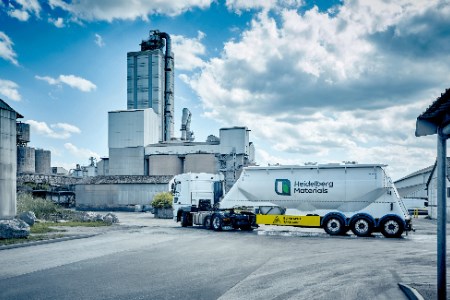Heidelberg Materials to begin construction of world's first carbon capture cement facility
Published by Alfie Lloyd-Perks,
Assistant Editor
World Cement,
- Heidelberg Materials and the UK Government have reached a FID (Final Investment Decision) to build the world’s first carbon capture facility to enable fully decarbonised cement production.
- The carbon capture and storage (CCS) project at the company’s existing cement works at Padeswood in north Wales will enter into the construction phase later this year and enable production of evoZero carbon captured net zero cement for the construction industry in 2029.
- It will help position the UK as a leading global force in CCS and act as an exemplar project, paving the way to decarbonising other heavy industries.
- The Padeswood CCS project brings significant economic benefits to the area through investment and job creation and aligns with the UK Government’s ambitions to reduce CO2 and deliver economic growth through construction.

Heidelberg Materials is building the world’s first carbon capture facility to enable fully decarbonised cement production after reaching a FID with the UK Government for its carbon capture and storage (CCS) project in north Wales.
The announcement, made today by Michael Shanks, Energy Minister in the Department for Energy Security and Net Zero, allows the company to start construction of a carbon capture facility at its Padeswood cement works later this year and will enable production of net zero cement in 2029.
The funding decision aligns with the UK Government’s ambitions to reduce CO2 emissions and deliver economic growth through construction.
Simon Willis, CEO at Heidelberg Materials UK, said: “Our constructive partnership with the UK Government has allowed us to reach this major milestone, which is fantastic news, not just for us, but for the industry as a whole.
“Our new facility at Padeswood will be a world-leader. It will capture around 800 000 tpy of CO2 from our existing cement works, allowing us to produce evoZero carbon captured net zero cement, which will help the UK construction industry reach its decarbonisation aims.
“CCS is a growing sector worldwide and our Padeswood project is an exemplar, helping position the UK as a global force at the forefront of this technology. It will also pave the way to decarbonising our domestic cement industry, helping it remain competitive while mitigating against climate change.”
Cement is an essential construction material. It is the ‘glue’ in concrete, the most widely used building material in the world, but its production gives rise to CO2. As these emissions result from the chemical process involved in cement’s manufacture, they cannot be avoided by using low carbon or renewable energy sources. The only way to remove them and produce the net zero cement the UK needs is to capture them using CCS before they enter the atmosphere.
The carbon capture facility at Padeswood is designed to capture almost all (around 95%) of the CO2 emissions from the process. The emissions captured from the kiln include biogenic CO2 from biomass fuels, mainly from domestic food, wood and paper wastes that cannot be recycled, which could allow the cement produced at Padeswood to be net negative.*
The carbon captured at Padeswood will be compressed and transported via an underground pipeline for secure storage under the seabed in Liverpool Bay as part of the HyNet North West project.
Heidelberg Materials’ CCS project will bring significant economic benefits to north Wales through investment and job creation: it will protect over 200 jobs and create around 50 new ones, as well as up to 500 more during construction.
Energy Minister Michael Shanks said: “Our clean-energy mission means good jobs, regional growth, and investment for local communities.
“This trailblazing cement works showcases the north Wales workforce on the global stage – leading the charge in the clean industries of the future and powering Britain’s reindustrialisation through this UK-first project.”
Today’s announcement is another demonstration of Heidelberg Materials’ commitment to decarbonising cement production through CCS. The Padeswood project is the first of its kind in the UK and is Heidelberg Materials’ first full-scale carbon capture facility to reach FID. It follows the official opening of the world’s first carbon capture facility at a cement works at its Brevik site in Norway in June this year. Here, 50% of the plant’s CO2 emissions are being captured as part of the Norwegian government’s Longship programme.
Comment from Dr Diana Casey, Executive Director for Energy and Climate Change, Cement and Lime at the Mineral Products Association:
"The green light for the UK’s first carbon capture-enabled cement plant at Padeswood is a landmark step on the road to decarbonising our domestic cement industry – it will safeguard existing skilled jobs and create new opportunities too."
"Public investment in this project provides a strong vote of confidence in the technology and recognises the vital role cement plays in supporting economic growth while delivering on the transition to net zero. Decarbonising heavy industry is not only essential for meeting climate goals, but also for securing the future of communities across the country – today’s announcement delivers on both."
Click here for free registration to World Cement
Read the article online at: https://www.worldcement.com/europe-cis/25092025/heidelberg-materials-to-begin-construction-of-worlds-first-carbon-capture-cement-facility/
You might also like
The World Cement Podcast
A podcast series for professionals in the cement industry featuring short, insightful interviews. Subscribe on your favourite podcast app to start listening today.

